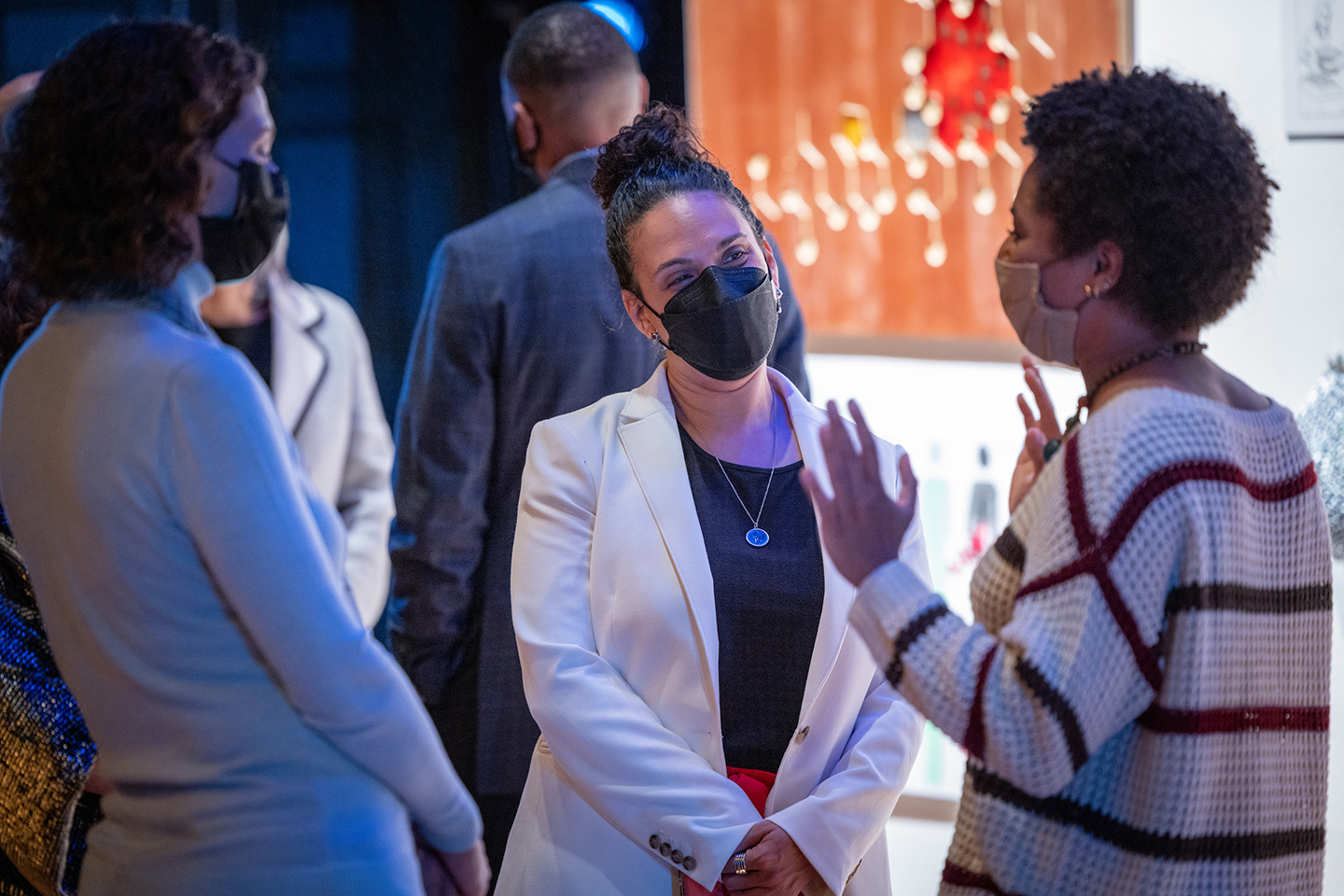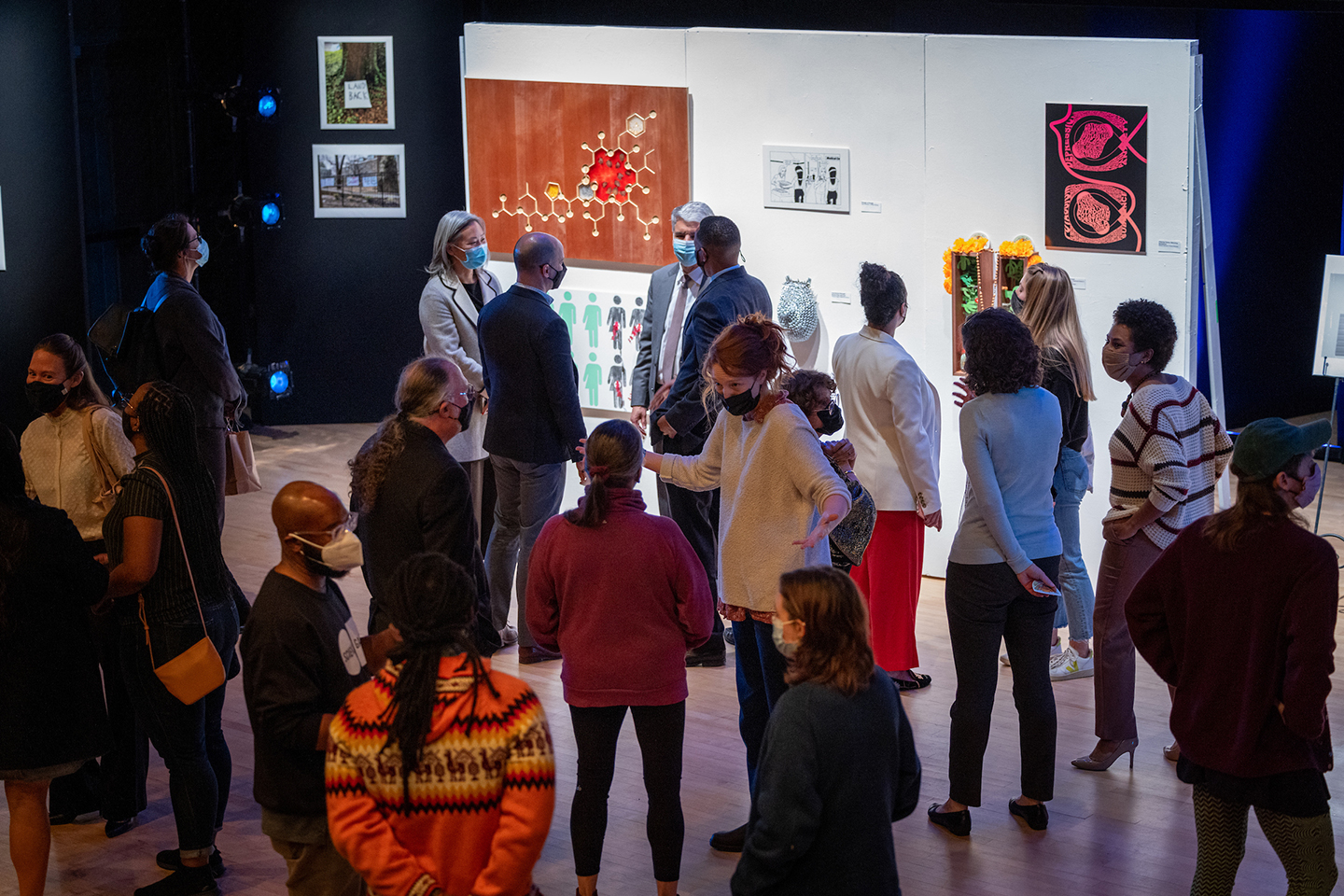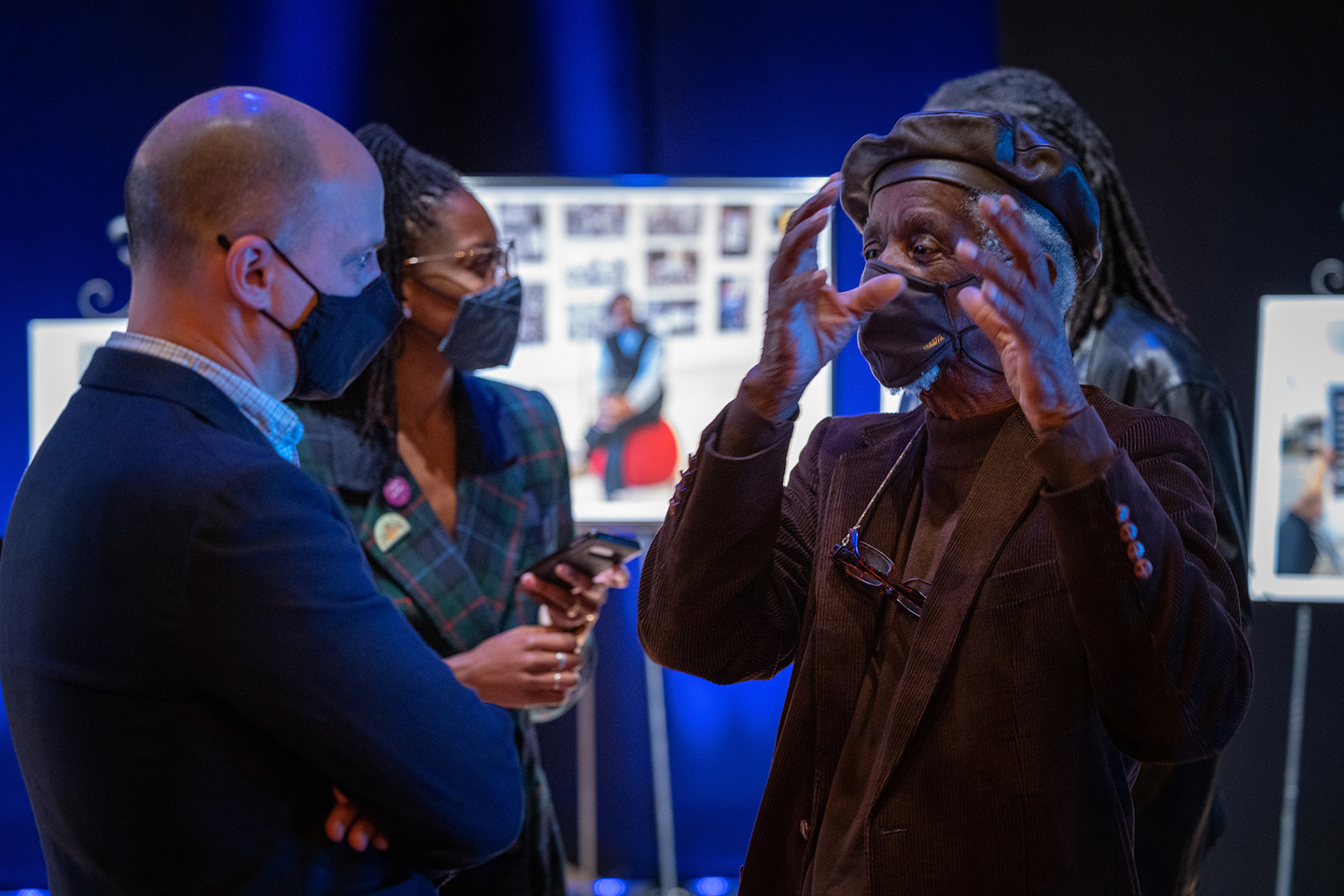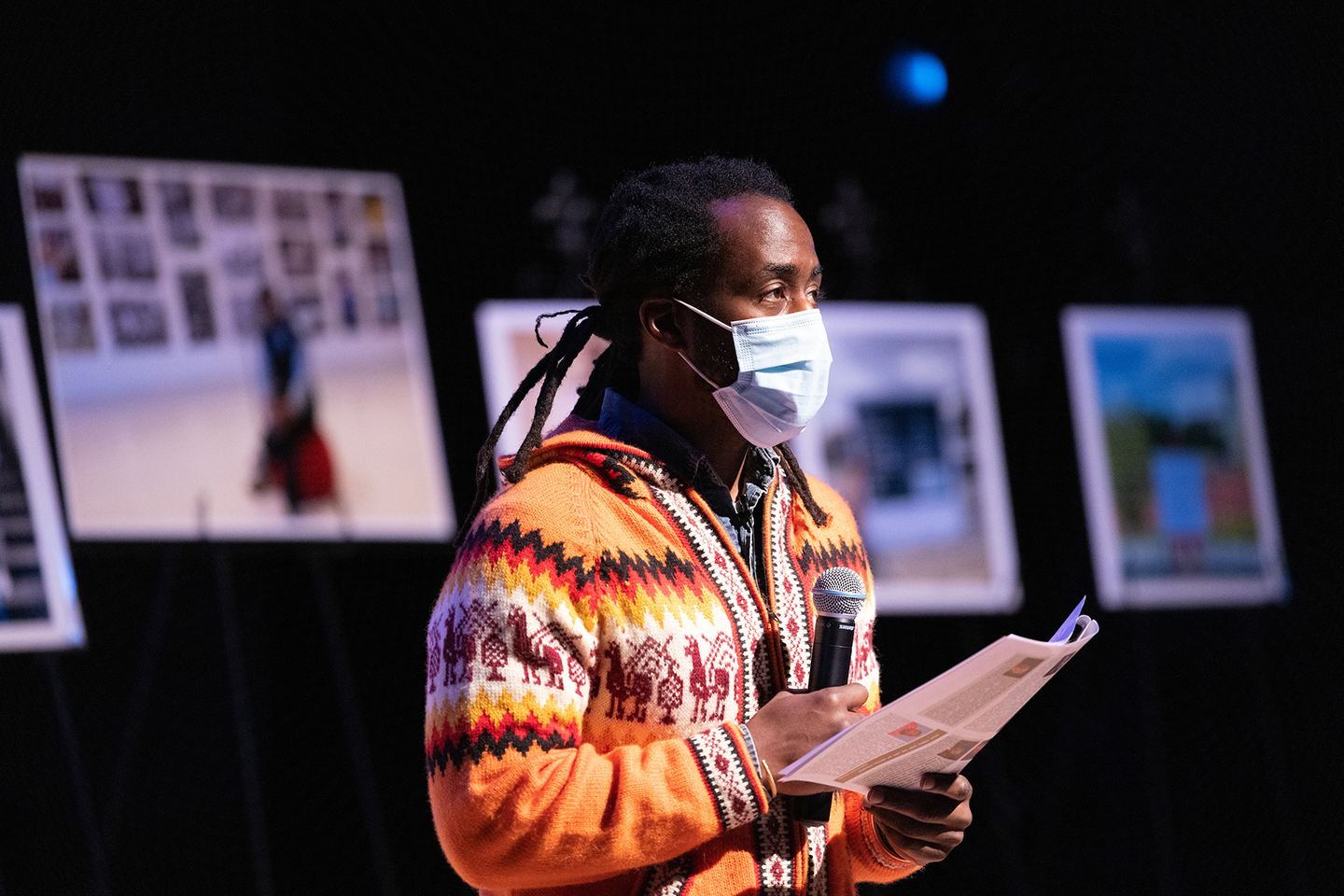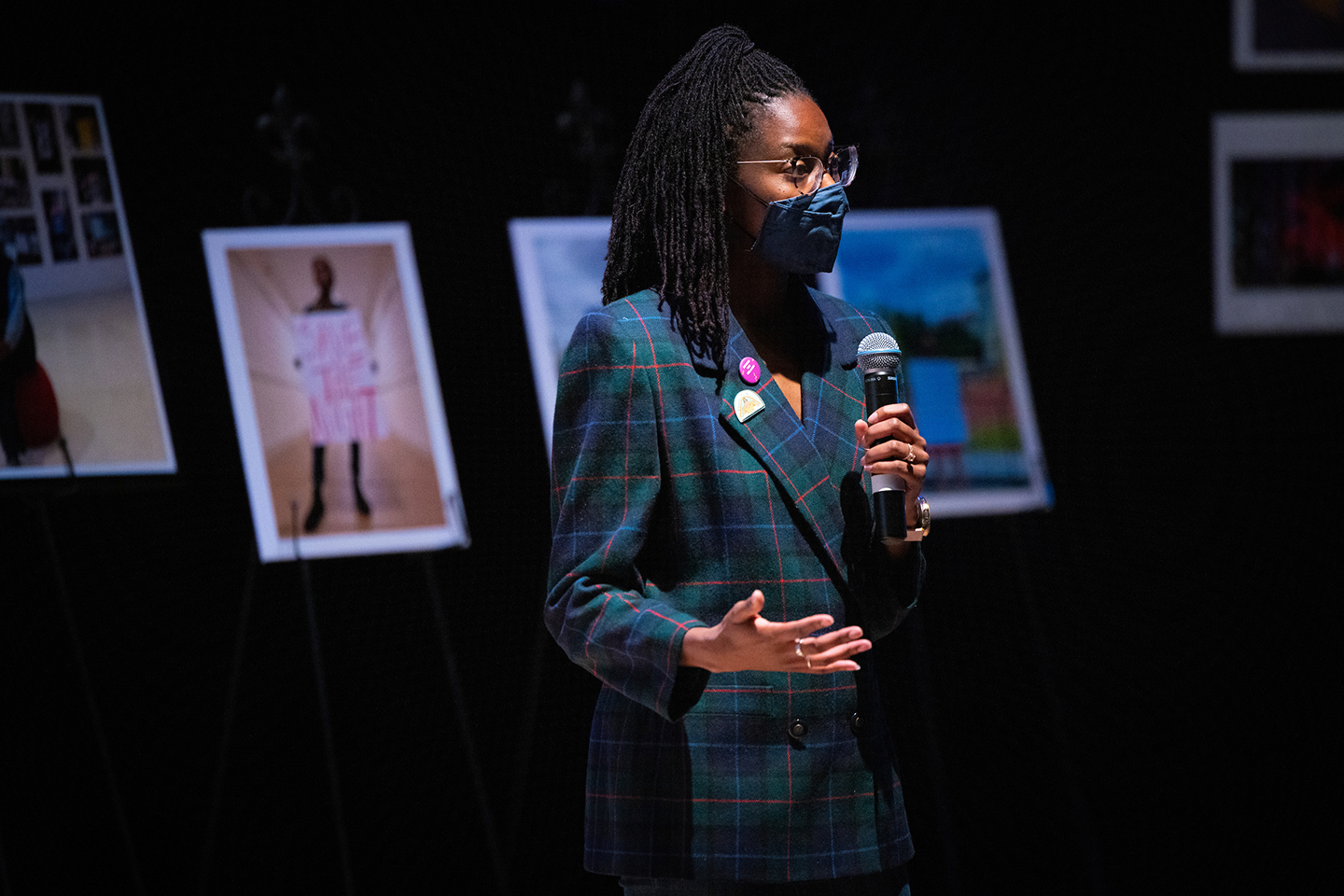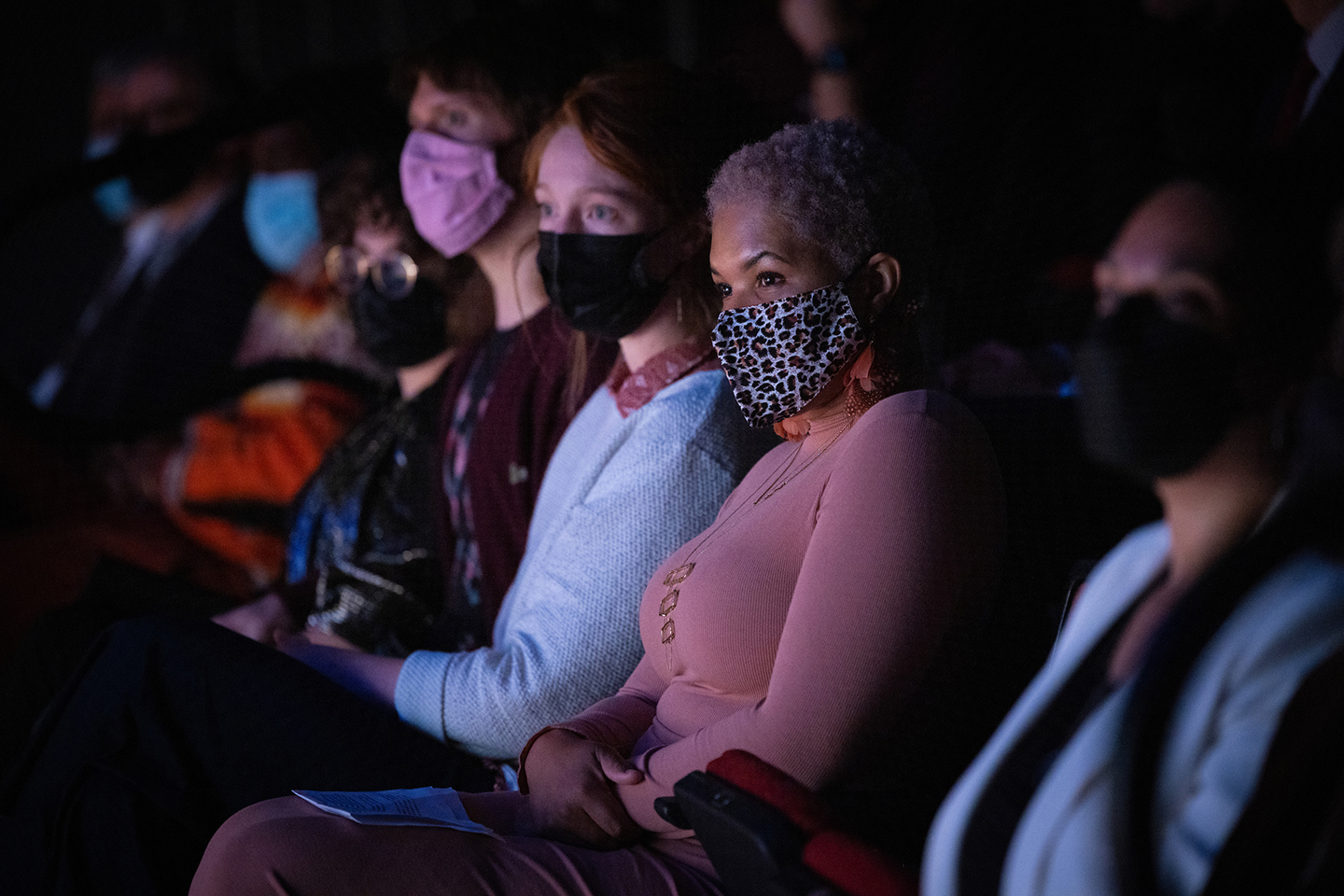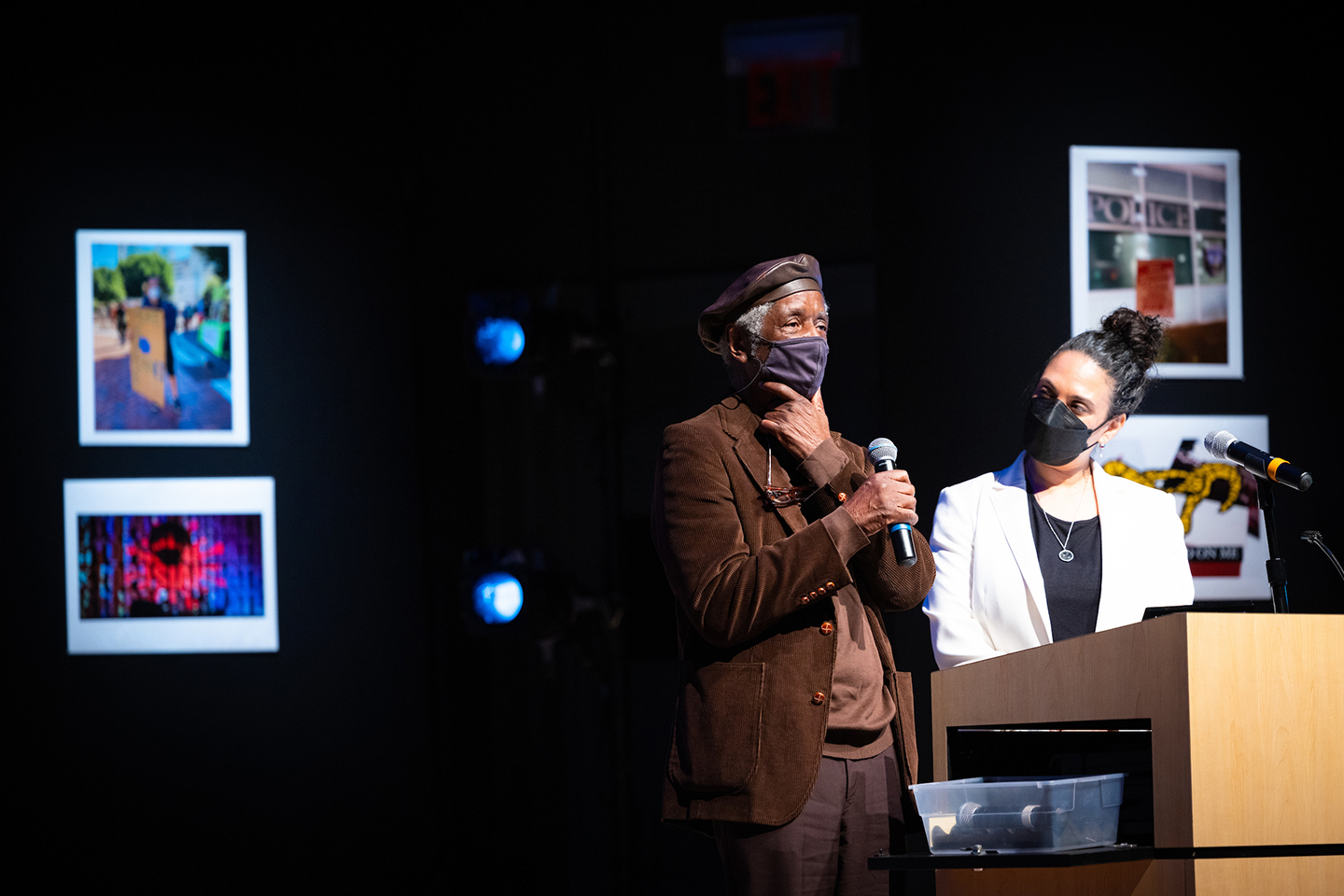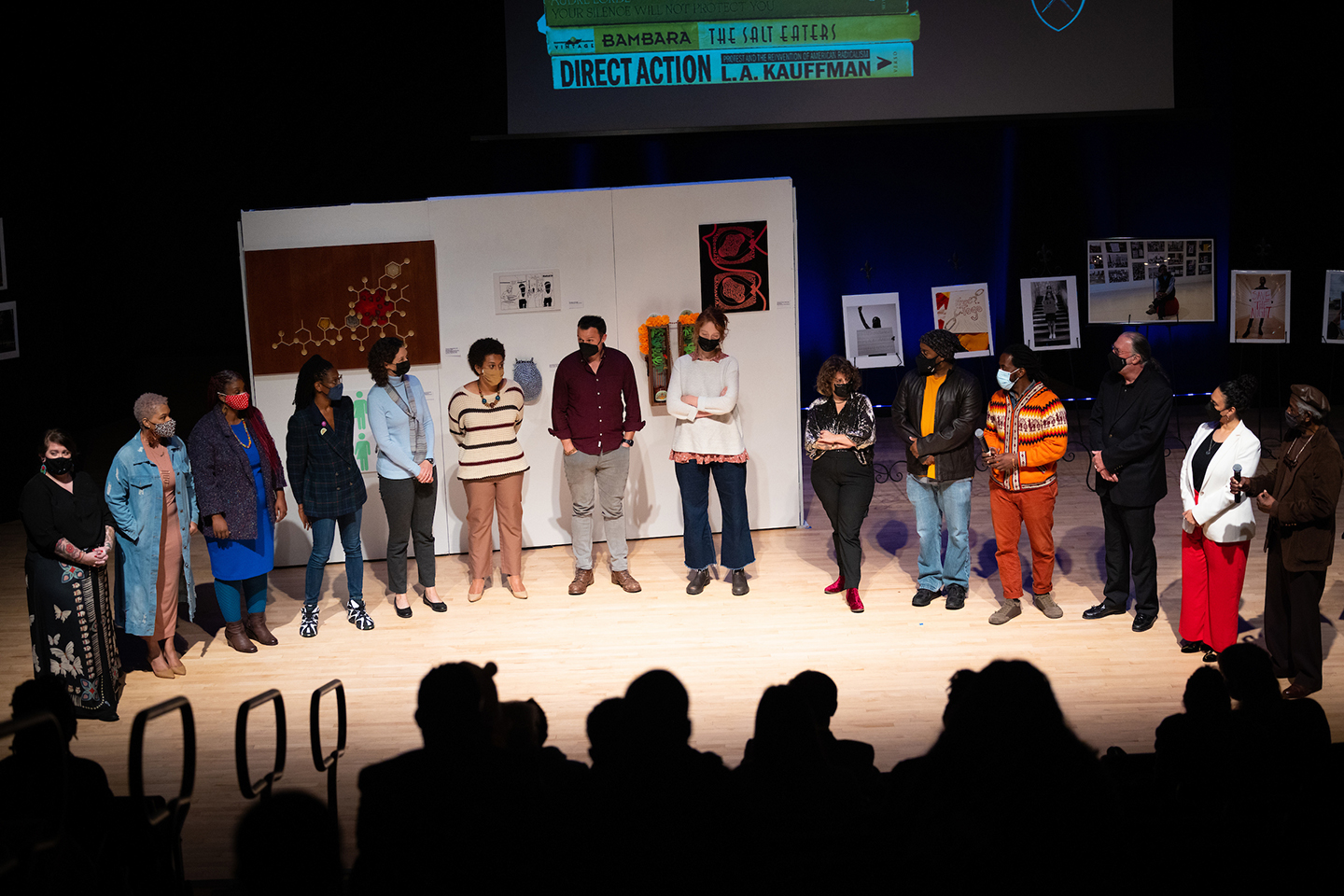The Arts & Social Justice Fellows Program adds new dimensions to existing courses through collaboration with Atlanta artists
Students in Emily Burchfield’s “Environmental Data Science” class are there to crunch the numbers. However, in its last iteration — as part of the Arts & Social Justice (ASJ) Fellows program — students were solving for questions that defy a quantitative answer.
A partnership among Emory College of Arts and Sciences, Emory Center for Ethics and Emory Arts, the ASJ program brings Atlanta artists into Emory classrooms to help students translate their learning into creative activism in the name of social justice. This year, seven artists partnered with faculty in Emory College of Arts and Sciences, Laney Graduate School, Nell Hodgson Woodruff School of Nursing and Candler School of Theology to co-teach existing courses.
The program is now recruiting for its third cohort, for classes to take place in fall 2022. Faculty applications are open until March 22. Artist applications will open April 1 and close April 15.
Elizabeth Jarrett, an experiential designer who is part of Science Gallery Atlanta, joined Burchfield’s class and suggested a theme well known to admirers of Alice Walker, who described her writing as “the work my soul must have.” Jarrett asked the students, “What is the work your soul must have?”
In answering, they revealed not just an expected facility with data but an equal capacity for reflection. As Burchfield, assistant professor of environmental sciences, notes, “With Elizabeth’s help, we wove together two very different ways of making sense of the world, helping students bring their whole selves to trying to understand these massive global challenges we are grappling with.”
The class ultimately created an interactive, multimedia map of four neighborhoods in Atlanta, but the building blocks were the students’ poems, songs, websites and audio recordings. Before analyzing changes in these neighborhoods during the past 10 to 15 years — especially regarding gentrification, poverty and food access — they first had to challenge their own objectivity by asking themselves, according to Jarrett, “What patterns and motifs in my history will influence my findings?”
During the Dec. 15 Project Showcase and Community Conversation put on by the ASJ program, which was held at Emory’s Performing Arts Studio and livestreamed, Burchfield and Jarrett played one student’s audio recording. After identifying as Asian American, she continues, “Though thankfully not subjected to overt racism, I have definitely been asked too many times to count, ‘Where are you from?,’ and Pennsylvania is not the answer they are looking for.”
Project Showcase and Community Conversation
Using Google Earth, the students were asked to show their home and describe changes both visible and invisible. In another recording, a student comments, “I type an address into Google Earth, and the globe spins until landing comfortably on the maybe 10 blocks where I spent the first 18 years of my life. I think, these are a collection of streets and memories called home. I worry for the future of many Californians, especially for grandparents with no AC as temperatures rise and relief is few and far between.”
The class divided into four groups, choosing among Atlanta’s Kirkwood, West End, Summerhill and Old Fourth Ward neighborhoods. They were asked to track their own food access living on campus and then to describe what that access would be if they lived in one of the neighborhoods. The differences were vivid, pointing students to the intersection between environmental justice and economic and racial justice.
Acknowledging her debt to Jarrett, Burchfield concluded, “In our department, we spend a lot of time thinking about climate change, about how adaptation to it will be inevitable and necessary. We need these creative moments — this broadening and deepening of spirit — to change broken patterns in order to create new ways of being, doing and living in the world.”
Out of deep pain, a means of healing
Addressing the crowd, Carlton Mackey recalled the program’s origins. Conceived in the throes of the pandemic and the national racial reckoning of summer 2020, “it was birthed out of a time of chaos and deep pain.”
For Mackey — co-director/co-founder of the ASJ program, director of the Ethics and the Arts program and associate director of the D. Abbott Turner program in Ethics and Servant Leadership — one silver lining was the university’s willingness to get behind the program, seeing it as a source of inspiration and a means of healing.
“This program,” noted Mackey, “helps the university live into its claims. To be a place of courageous inquiry. To be a place of transformative pedagogy. And to be a place that is deeply engaged in the Atlanta community. What you will see tonight shows that Emory has made good on that commitment.”
Mackey was joined by President Gregory L. Fenves and Kevin Karnes, co-director/co-founder of the ASJ program and associate dean for the arts in Emory College.
“Already, in its short time, the program has produced powerful collaborations and new connections with Atlanta artists. Artistic expression offers both a snapshot of the times we live in, an understanding of our history and an inspiration and hope for the future. We are a stronger community because of the work you are doing.”
Established and emerging artists
With that, emcee Floyd Hall, creative producer of Science Gallery Atlanta, ticked off a who’s who of the city’s leading artists. In addition to Jarrett, they included documentary photographer Jim Alexander, photographer and interdisciplinary artist Stephanie Brown, dancer and choreographer Indya Childs, comedian Mark Kendall, curator Miranda Kyle and actor and playwright Lee Osorio.
Beyond the environmental science class, the classes were as far-ranging as the artists' talents, encompassing topics such as determinants of human health, diagnosis bias in assessing the conduct of BIPOC children, voices of nonviolence, the work of the Georgia Innocence Project, anticolonial thought and art in the Caribbean and a survey of African American literature to 1900.
The students’ creative expression crossed many different art forms. But they were not the only creators; faculty answered the call as well. For instance, Shaquita Starks, assistant professor of nursing, in the course on BIPOC children, wrote a poem from the perspective of young Black man, part of which reads:
I am not asking you to walk in my shoes
But I am asking you to understand what I’ve been through
. . .
Walking outside to see your dead hommies in the street
Week after week after week
Constantly harassed by the police
As the evening concluded, Karnes looked forward to the next year, acknowledging “all the amazing work that everyone at Emory Arts has done to help us continue the program and build it, applying vision behind how it might grow.”
For his part, Mackey confessed to running out of words, saying only, “It felt like church. My spirit is full.”
View the Arts & Social Justice Fellows website
The classes
Learn more about each class and view their final projects.
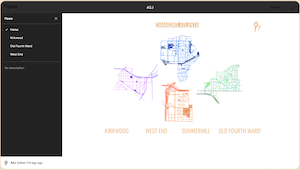
Professor Emily Burchfield and experiential designer Elizabeth Jarrett challenged students to consider how their world-view, biases and experiences affect their work as data scientists. As one student concluded, “Data can only represent where you fall in the distributions of others, not the emotions that come of understanding your place in that distribution.”
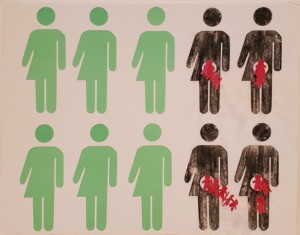
School of Nursing professor Rasheeta Chandler, Atlanta artist Stephanie Brown and six nursing PhD students examined social determinants of health, everything from prenatal care to palliative care. For student Karen Molton, what art brought to their inquiries was “a beautiful way of distilling things down to a singular message all the while expanding discussion around that.”
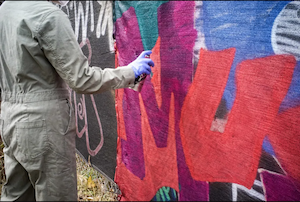
School of Nursing professor Shaquita Starks and Miranda Kyle, curator, teamed up in this undergraduate mental health course to guide students from self-care to community care, starting with Kyle’s question: “What cultural or artistic elements do you bring from home or your life to get through this nursing program, get through finals, get through the stress of living in what feels like a postapocalyptic universe right now?”
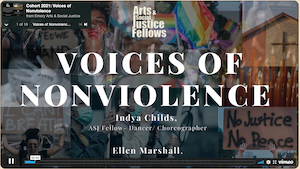
Ellen Ott Marshall, Candler School of Theology professor, guided students through an introduction to the theories, theologies and practice of nonviolence, while dancer and choreographer Indya Childs asked them “to think about activism and nonviolence not just through their minds but through their bodies, their whole selves.”
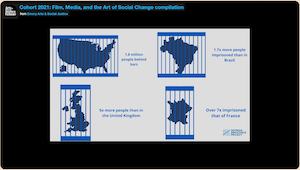
In this course, Ethics Center faculty members Carlton Mackey and Edward Queen examined how films in particular effect or impede social change. Working with Atlanta comedian Mark Kendall and the Georgia Innocence Project, students created documentaries to chronicle the experiences of those who have been wrongly convicted by the criminal justice system.
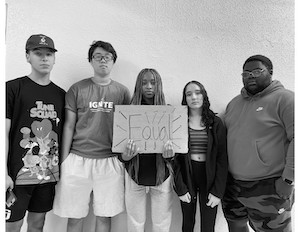
Michelle Gordon, professor of African American studies, surveyed early African American literature and print culture from the Revolutionary Era through the turn of the 20th century in league with Jim Alexander, whose photography chronicles more than a half century of Black and American life, culture and social justice struggles. According to Gordon, one course goal was to use Alexander’s body of work and the texts “as inspiration to use our own voices to advocate for what we believe is right, to defend our own rights, and to stand up for the rights of others.”
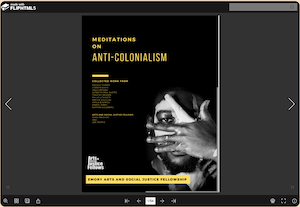
Sean Meighoo, professor of comparative literature, and Lee Osorio, actor and playwright, asked students to examine the struggles mounted against European colonialism in the 19th and 20th centuries, and the result was a book titled “Meditations on Anti-Colonialism” conceived, says Osorio, “during the pandemic of the coronavirus but deep-diving into the not-so-novel pandemic of racism.”
Faculty and artists invited to apply for fall 2022
The ASJ program intends to select faculty members by the time of fall registration (March 28 for undergraduates; other registration dates vary by school) so that students will know which courses will have that focus.
Faculty applications for the 2022-2023 school year opened March 1 and close at 11:59 p.m. EST on March 22. Selected applicants will be interviewed and notifications will be announced on March 25. These dates may be subject to change. Last year’s faculty are featured in a video describing the way that an arts and social justice lens enriched their courses. Emory faculty from all divisions of the university are encouraged to apply. Visit the ASJ website’s faculty FAQ page for more information.
ASJ artist-fellows engage faculty members to design a creative project that reflects on racial or other inequities and then embed their project in one of the faculty member’s existing courses. Atlanta-area artists will be invited to apply beginning April 1. Interviews for selected applicants will occur April 21, 22 and 25. Final notifications will be announced April 29.

